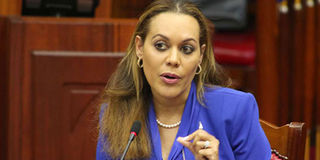Mwinzi citizenship issue irks Kenyans in diaspora

Ms Mwende Mwinzi is vetted by the National Assembly's Defence and Foreign Relations team for the South Korea envoy post on May 28, 2019. Her dual citizenship is derailing her from executing her duties. PHOTO | FILE | NATION MEDIA GROUP
What you need to know:
- For Ms Mwinzi, the question has been whether being ambassador could put her in conflict of loyalty.
- Ms Mwende argued that dual nationality does not affect ambassadors, even though they may be considered State officers.
The National Assembly’s demand that Ms Mwende Mwinzi renounce her US citizenship to get an ambassadorial post has incensed Kenyans in the diaspora, who claim they are being locked out from serving the country.
The issue has brought to the fore the question of dual citizenship, and how it is a double-edged knife.
The nominated ambassador to South Korea, who holds both American and Kenyan citizenships by birth, now faces the choice between taking the job and retaining her dual nationality.
The Nation has learnt that Seoul already granted her approval to report to her diplomatic duty station.
On August 6, South Korea granted her an agrément, a document which, in diplomatic terms, refers to the approval by the receiving state of a diplomat from the appointing state to live and in the country.
This means that Ms Mwinzi is now only required to apply for a visa to South Korea, after which she can start working after presenting her credentials.
MPs DEBATE
But the National Assembly’s demand that she renounce her US citizenship is the new and last remaining hurdle.
Last week, Foreign Affairs Cabinet Secretary Monica Juma pledged to abide by the law in dealing with the issue, but steered clear of whether Ms Mwinzi, who has been part of the 18 recent envoys taking up training for new postings, will report for duty after all.
“We are in the administrative process and nobody has taken up their position, and so we have not offended any decision of Parliament and we do not intend to do so,” she told journalists at a quarterly press briefing in Nairobi.
“This nominee was vetted and approved by Parliament. And Parliament then had a caveat on the taking up of the position. So there is an approval process after meeting all the qualifications that had been tested for, and Parliament felt that she needed to renounce the citizenship of the USA,” Ms Juma said.
FOREIGN EXCHANGE
With uncertainty surrounding her appointment, the Kenya Diaspora Alliance (KDA), which represents a grouping of associations of Kenyans living abroad, said the National Assembly was engaging in an illegality by forcing her to renounce a citizenship she did not choose.
“The ideal should have been for Parliament to seek an advisory opinion on the matter, or direct the Attorney-General to do so from the Supreme Court.
"The legislation they are relying on is itself ultra vires (beyond powers) and unconstitutional, therefore offending,” Dr Shem Ochuodho, the KDA Global Chairperson told the Nation.
“We urge the honourable members of Parliament to seize the opportunity to make these ‘forgotten Kenyans’ too to start feeling they belong."
The lobby argued that Kenyans in the diaspora already sent in more money than Kenya’s annual foreign direct investment, making them the highest foreign exchange earners for the country.
CONSTITUTION
Mr George Mucee, the practice leader at migration consultancy firm Fragomen-Kenya, said the Constitution would not bar her from serving as an ambassador, especially since she is legally a citizen by birth, both in Kenya and the US.
“Ambassadors are not state officers. So strictly speaking, she is not barred by the law,” he said.
“But, it is also a tricky affair and exposes the challenges we face in understanding the rights of Kenyans holding dual nationality.”
For Ms Mwinzi, the question has been whether being ambassador could put her in conflict of loyalty. MPs cited the Leadership and Integrity Act, which is not a citizenship law.
The philanthropist famed for her Twana Twitu Children’s orphanage was born in Milwaukee, Wisconsin, of Kenyan parents.
Traditionally, citizenship by birth cannot be revoked, but can be renounced through a lengthy procedure.
DUTY
But with her nomination as envoy, she seems to be meeting legal hurdles that escaped her before.
In 2017, she unsuccessfully ran for the Mwingi West parliamentary seat. As MPs are also state officers, the question of her dual nationality would have arisen had she won.
During her vetting, Ms Mwende, 48, argued that dual nationality does not affect ambassadors, even though they may be considered State officers.
She also defended her loyalty to Kenya. “From my adulthood, everything about my life has been Kenya-bound,” she said.
“Every envoy is first a national, a defender … so your first mandate and only mandate is to serve the country. Every person will look at the ambassador and realise that they are the first port of call when the president calls on them for local intelligence.”
However, the procedure for renouncing US nationality is longer than imagined.
PROCESS
According to the US Immigration and Nationality Act, one has to appear before their embassy in person and sign an oath of renunciation.
Once approved, one has to forego every other privilege, including right to live in the US, and may be required to get a visa.
Also, one cannot renounce nationality of their children because citizenship is granted personally. Once accepted, it cannot be reversed, except by a court order.
However, a renunciation may still be rejected by US authorities. “Renunciation is the most unequivocal way by which a person can manifest an intention to relinquish U.S. citizenship. Please consider the effects of renouncing US citizenship, described above, before taking this serious and irrevocable action,” warns the US State Department.





